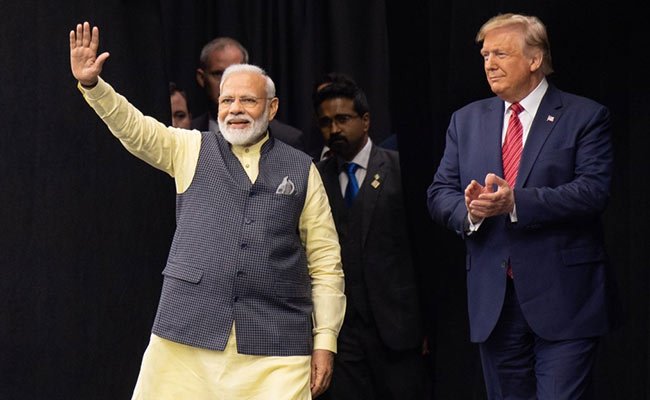New Delhi:
Prime Minister Narendra Modi and Donald Trump call each other friends, but analysts say a looming trade dispute will test their close relationship when the latter becomes president again.
The hugs and bonhomie between the two men in formal meetings belied Trump’s occasionally aggressive approach to New Delhi during his first term, when he called India the “tariff king” and a “trade abuser.”
Trump has promised to impose “reciprocal” tariffs on countries with trade surpluses with the United States, a move that could hamper industrial development in the world’s fifth-largest economy.
“Look at where Trump wants to take the United States… bringing economic and industrial activity back to the United States,” Indrani Bachchi, chief executive of the Delhi-based Ananta Aspen Center think tank, told AFP.
“For decades, America has believed that things are made elsewhere and are cheaper,” she added.
“If manufacturing does move back to the United States, what does that mean for countries that have trade surpluses with the United States?”
India is the ninth largest trading partner of the United States, with a trade surplus of more than $30 billion in the 2023-24 fiscal year.
Prime Minister Narendra Modi’s government has also sought to promote local manufacturing through the “Make in India” campaign, offering simplified laws and generous tax incentives to new businesses.
The move is already bearing fruit as Apple and other tech giants seek to diversify their supply chains outside of China.
India’s largest technology companies, including TCS and Infosys, have become corporate behemoths by providing their U.S. counterparts with a means to outsource their information technology needs to cheaper labor.
Ashok Malik of business consultancy Asia Group told AFP that all industries could be hit if Trump seeks to fulfill his promise to bring jobs back home and launch a “tariff war”.
He added that Trump’s retaliation for his aggressive trade policies in his first term would again be mainly directed at China, “but India will not be unaffected”.
“a friend of mine”
During Trump’s first term in 2019, Prime Minister Modi and Trump appeared together at a Houston stadium, extolling each other’s praises and touting a close personal alliance in front of tens of thousands of Indian Americans.
About 50,000 people attended the event, which was billed as the largest gathering ever held in the United States for a foreign leader other than the pope.
The next year, Prime Minister Modi returned the favor by holding a rally in his home state of Gujarat, attended by an estimated 100,000 people.
“He’s my friend,” Trump said of Prime Minister Modi last month on a podcast hosted by comedian Andrew Schultz.
“From the looks of it, he’s like your dad. He’s the best. A total killer.”
Harsh V. Pant, a professor at King’s College London, told AFP that India would benefit from the personal warmth between the two leaders.
“Modi is definitely the kind of strong leader that Trump likes,” he said.
“Embracing Modi is politically convenient, the optics are good, and there are a lot of positives that Modi can capitalize on.”
Immigration ‘PR disaster’
Still, there could be major diplomatic friction that undermines their friendship in the coming years.
India is one of the largest sources of legal immigrants to the United States, but tens of thousands of Indians have also entered the country illegally through the Canada-Mexico border in recent years.
Batch said this is bound to become an issue as Trump pursues his stated policy of cracking down on illegal immigration.
“If Indians were rounded up and deported en masse, we would be facing a public relations disaster,” she added.
Under the Modi government, India has forged a series of new partnerships with the United States, including in defence, technology and semiconductor production.
The world’s most populous country is also a member of the US-led Quad alliance, which along with Australia and Japan is seen as a means to counter China’s growing power in the Asia-Pacific region.
Painter said Trump’s “unpredictability” cast doubt on whether the trajectory of closer cooperation would continue.
“The fact that he does not see the world in a strategic sense and there is always an inherent transactionalism in his approach complicates matters and creates uncertainty.”
(Except for the headline, this story has not been edited by NDTV staff and is published from a syndicated feed.)

